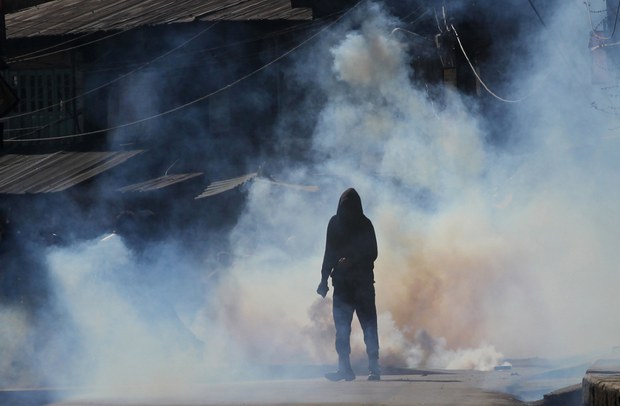Kashmiris Protest ‘Excessive Force’
2016.03.04
Srinagar, India
 Tear gas engulfs a Kashmiri demonstrated in Srinagar after Indian forces fired tear-gas canisters and pellet guns as hundreds of rock-throwing youths staged a protest, Feb. 26, 2016.
Tear gas engulfs a Kashmiri demonstrated in Srinagar after Indian forces fired tear-gas canisters and pellet guns as hundreds of rock-throwing youths staged a protest, Feb. 26, 2016.
Each time a so-called militant is killed in an encounter in Indian-administered Kashmir, Feroz Ahmad walks out into the streets of Srinagar with his face covered, ready to take on what he calls Indian security forces’ excessive control over the disputed Himalayan region.
Slain insurgents are labelled as “militants” by the Indian army, but they are “Kashmiri freedom fighters” as far as Ahmad, a 21-year-old post-graduate student from Pulwama district in Jammu and Kashmir state, is concerned.
“Indian forces have been committing unprecedented excesses on the people of Kashmir and those who are fighting for Kashmir’s freedom from Indian rule. The Indian government and the Indian media calls them militants. In actuality, they are freedom fighters, trying to liberate Kashmir from Indian oppression,” Ahmad told BenarNews.
Ahmad is one of hundreds of Kashmiris who take to the northern Indian state’s streets to protest what the Indian government calls “terrorist encounters.”
Ahmad admits he is one of many who routinely throw stones and petrol bombs at Indian security forces after news of any such encounter breaks.
“I cover my face with a piece of cloth because I don’t want to be identified,” he said.
“Once the Indian army or police identifies you, they will go to any extent to subdue you,” Ahmad said.
Rebellious youth
Kashmir, a predominantly Muslim region, is bearing the brunt of the 1947 partition of the Indian subcontinent that followed the end of British rule.
Both India and Pakistan lay claim to the Himalayan region, which has been a flashpoint in diplomatic ties between two sides for over six decades.
Moments after Indian security forces said they had neutralized suspected terrorists who had infiltrated a government building last month in Pampore – situated on the outskirts of Srinagar - Ahmad and hundreds of other protesters clashed with armed forces.
Six Indian security personnel and a civilian were killed in the attack that lasted 48 hours, before the three assailants were killed.
While the operation was on, anti-India chants echoed from across the street.
“Kashmiri people fully support the armed rebellion waged by freedom fighters against Indian rule. That is why each time these fighters are trapped in encounters, locals spare no efforts to engage security forces so that it gives the fighters more time to inflict maximum damage,” Ahmad said.
Ahmad said his rebellious attitude stemmed from “the fact that Indian security forces have killed many innocent Kashmiris, passing them off as terrorists.”
According to official figures, about 70,000 people have been killed since the outbreak of the insurgency in Jammu and Kashmir in 1989. Rights groups allege that a large majority of these deaths include civilians shot in encounters by Indian armed forces.
There are other Kashmiris who have disappeared without a trace for years.
Statistics compiled by the Association of the Parents of Disappeared Persons (APDP), a Srinagar-based volunteer organization, show that some 8,000 Kashmiris have gone missing since the separatist insurgency broke out.
The Indian government, however, puts the figure at under 3,000.
‘In a flash, she was gone’
A senior state police official said the locals were being provoked into fighting authority by people with vested interests.
“Recently, our forces killed three militants who belonged to Lashkar-e-Taiba [a Pakistan-based banned outfit]. We wanted to bury the slain quietly, in accordance with the law as there were no claimants. But some miscreants provoked people to protest these killings and there was a clash with security forces,” Gareeb Das, J&K’s deputy inspector general of police, told BenarNews while referring to an encounter in January.
But Kashmiri separatist factions refuse to buy that.
“When a law enforcing agency doesn’t even show the bodies of the dead, their claims of killing Pakistani militants is doubtful,” Mirwaiz Umar Farooq, chairman of Hurriyat Conference, an amalgam of 32 Kashmiri separatist groups, told BenarNews.
There are also the likes of Abdul Hamid, who, although he has no stated desire for “freedom,” carries an immense hatred of Indian rule.
Last month, Hamid’s 22-year-old daughter, Shaista, was killed in indiscriminate police firing during a protest over the killing of a separatist youth.
“There was a lot of noise in the neighborhood that day. Shaista stepped outside to take a peek when a bullet pierced her head. In a flash, she was gone,” Hamid told BenarNews.
“I believe the Indian army and the government, which controls the security forces is responsible for my daughter’s death. She wasn’t a protester. She didn’t even know or care about the fight for Kashmir. But she died of a gunshot to the head. You ask me, should I be angry at India?”
Adeel Shah in Srinagar contributed to this report.







